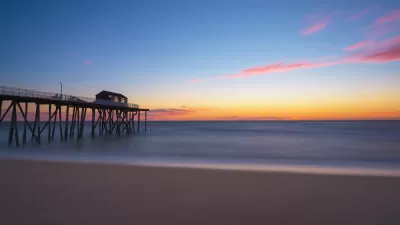Local critics of Gov. Phil Murphy’s plan to install hundreds of wind turbines off the New Jersey coast plan to sue the state to stop or delay the projects, citing aesthetic, environmental, and economic concerns.

Half of New Jersey’s electricity could be powered by offshore wind energy by 2035 under a plan put into motion by Governor Phil Murphy in 2018. As Jared Brey explains in Governing, the plan more recently calls for 100 percent clean energy by 2050 and has led to three offshore wind projects approved so far.
While offshore wind is “broadly popular” among New Jersey residents, local leaders in some coastal communities worry that the turbines will impact the state’s fishing industry, marine ecosystem, and tourism. Most complaints are directed at the visual impact of having the turbines within view, with opponents saying the visibility of the turbines could irreparably alter the character of the New Jersey coast. Some also claim surveying related to the wind projects could be related to several recent whale deaths in the area, a claim categorically denied by scientists and environmental groups.
At least two non-governmental opposition groups are preparing lawsuits against the state to stop the wind projects, and some municipalities have left the legal option open. “For now, the state is firmly in the driver’s seat. In addition to Murphy’s executive orders, the state Legislature approved laws allowing state authorities to bypass certain local approvals when it’s ‘reasonably necessary’ to pursuing the wind program.”
FULL STORY: Wind Turbines (and Lawsuits) Are Coming to the Jersey Shore

Alabama: Trump Terminates Settlements for Black Communities Harmed By Raw Sewage
Trump deemed the landmark civil rights agreement “illegal DEI and environmental justice policy.”

Planetizen Federal Action Tracker
A weekly monitor of how Trump’s orders and actions are impacting planners and planning in America.

How Atlanta Built 7,000 Housing Units in 3 Years
The city’s comprehensive, neighborhood-focused housing strategy focuses on identifying properties and land that can be repurposed for housing and encouraging development in underserved neighborhoods.

In Both Crashes and Crime, Public Transportation is Far Safer than Driving
Contrary to popular assumptions, public transportation has far lower crash and crime rates than automobile travel. For safer communities, improve and encourage transit travel.

Report: Zoning Reforms Should Complement Nashville’s Ambitious Transit Plan
Without reform, restrictive zoning codes will limit the impact of the city’s planned transit expansion and could exclude some of the residents who depend on transit the most.

Judge Orders Release of Frozen IRA, IIJA Funding
The decision is a victory for environmental groups who charged that freezing funds for critical infrastructure and disaster response programs caused “real and irreparable harm” to communities.
Urban Design for Planners 1: Software Tools
This six-course series explores essential urban design concepts using open source software and equips planners with the tools they need to participate fully in the urban design process.
Planning for Universal Design
Learn the tools for implementing Universal Design in planning regulations.
Caltrans
Smith Gee Studio
Institute for Housing and Urban Development Studies (IHS)
City of Grandview
Harvard GSD Executive Education
Toledo-Lucas County Plan Commissions
Salt Lake City
NYU Wagner Graduate School of Public Service





























